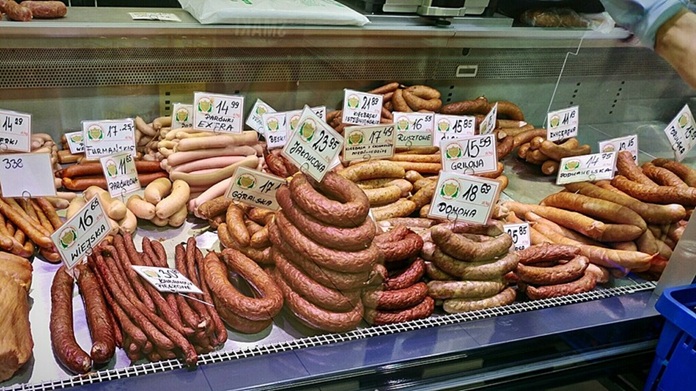Uncle Stanislaw
I still can hear the sound of acorns popping
Beneath the wheels of father’s horse-drawn cart
As we drove through the woods—four hooves a-clopping—
Where Uncle Stan, his brother, plied his art.
His smokehouse was a wreck of salvaged timbers,
His living room a den of salted hides,
But what his wide-eyed nephew best remembers
Is how the flesh and edible insides
Of animals were used to make outstanding
Kielbasa. “Fatter than last year,” he’d say,
“The hogs fed well and never stopped expanding,”
Which meant we’d all eat well on Christmas Day.
The sausage hung in coils and links from rafters
Above the smoky room, and rendered fat
Dripped to the floor in slick foreverafters—
No proper Polak would find fault with that.
His product was regarded as the best
For miles around, a tribute to the beasts
He fed and slaughtered. He was unimpressed
By what a Jew might think of pork-rich feasts.
Ever the Fall Guy
In autumn, I go out for morning strolls
Through unmown fields and densely-wooded lots.
If no one else is near, I let my dogs
Run free. They think the rabbits and the voles
Are for their fun, but leave the snakes and frogs
Alone. Their given names are Scout and Murdoch;
They seem to like the weediest of spots,
And soon their fur is tangled up with burdock.
I always notice, when I take these walks,
The desolation after summer’s end.
Such understated beauty makes me pause
And listen to the wizened flower stalks
That rustle in the breeze, in common cause
With every other plant that’s going under,
A fact I cannot alter or defend.
And then there comes the sound of distant thunder.
I move along, enjoying every stride,
And pay attention to the dampened crunch
Of brittle twigs that pave the woodland floor.
When thorns get in my way, I let them slide,
Because I don’t resent them anymore.
Time presses, but I’m disinclined to hurry,
Despite the fact I’ll soon be wanting lunch—
A break from creature needs is not a worry.
***
Diverted by the blue jays’ strident clamor,
I come across a badly smitten tree,
Split down the middle and completely barkless,
That shows where Thor had hurled his heavy hammer
And what will someday come for you and me.
I need a dram of twelve-year-old Glenfarclas
To clear my head and fortify my nerves,
The fate a falling man hopes he deserves.
C.B. Anderson was the longtime gardener for the PBS television series, The Victory Garden. Hundreds of his poems have appeared in scores of print and electronic journals out of North America, Great Britain, Ireland, Austria, Australia and India. His collection, Mortal Soup and the Blue Yonder was published in 2013 by White Violet Press.















C.B. from the age of three to six my father had one small room in the house devoted to curing pork with salt, hanging meat from the ceiling, and churning butter from cream after it had gone through a milk/cream separator. My grandfather also had one without flooring and packed dirt used for the same reasons. I can only imagine the taste of the great kielbasa. They did not make smoked sausage but always bought it at the grocery store. There is much to be said about being a “fall guy,” since it was a time of canning the last produce of summer, gathering the nuts, and enjoying the colors of the season before the first snowfall. How well you sculpted these two poems with lasting images that play in my head. “Barkless” rhyming with Glenfarclas is as inspired as the alcohol must have been. I have always loved your poems, and these are no exception. October was a great time to publish these.
Although, Roy, I have never raised hogs, I have raised and slaughtered rabbits, goats and chicken — plus all the canning and drying of fruit and vegetables, and the making of sauerkraut. I loved the country life, and in Blue, Arizona my next-door neighbors were the Lee brothers, nationally famous hunters and guides. Sometimes, when their hound dogs had successfully chased down some of the local large game, they would give me some bear or mountain lion meat. And the Blue River was full of rainbow trout. We ate like Nordic kings.
The thing I most enjoyed about these is the clear descriptions of sounds: acorns popping under the cart, along with the sounds of the horses hooves clopping, in the first poem; and “the dampened crunch of brittle twigs” underfoot in the second. Also, the comparison, at the end of “Fall Guy” to the man (narrator) who will fall, to the tree that fell, destroyed by Thor. I also enjoyed the interesting and consistent rhyme scheme in “Fall Guy”.
Sounds, Cynthia, are very important, especially for poets, as you are well aware, but the sounds of words and descriptions of sounds are two different things, though at times the two aspects coalesce. And don’t disregard the sound of distant thunder. Anyone who spends any time in the woods will from time to time come across ruined trees, for which there can be many causes. Nonce rhyme schemes are fun to generate, but it can sometimes be a challenge to duplicate such schemes in successive stanzas. You will have noted the break between stanzas 3 &4. This was necessary both because there was a change in rhyme scheme and because there was a shift in perspective.